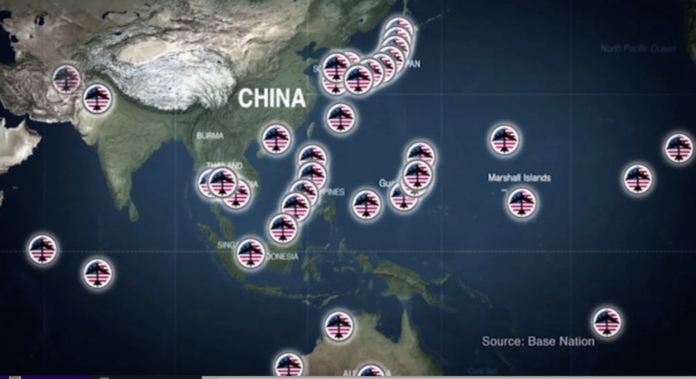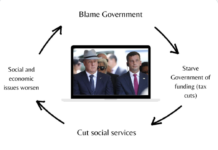A simple explanation of this week’s military and political developments in the Pacific
United States and Australia hold large military exchange
Since 2011, Australia has hosted regular exercises and training opportunities with the United States called ‘Force Posture Initiatives’. This relationship flourished and is gaining increasing importance, now extending across the Australian Army, Navy and Air Force.
This week 2500 United States Marines arrive in Darwin for a six-month rotation with the Australian military. This provides an opportunity for Australian forces to work closely with the United States Marine Corps allowing both parties to learn about each other and practice working together in combat. In military terminology this is known as ‘inter-operability.’
This exercise is reported because it demonstrates the increasing size and scale of Australian and United States planning and preparation. In 2011, a couple of hundred Marines visited Australia. This week more that ten times that number will be involved. And; Force Posture Initiatives provide the basis for other aspects of Australia’s defence relationship with the United States; like the AUKUS submarine announcement two weeks ago that included reference to the scheme.
Any United States military intervention in the Pacific is likely to be led by their Marine Corps and Australia is making sure that their military can work with them in partnership. A key takeaway is that as the United States and Australian defence relationship gets closer; retaining the ability to work in partnership rather than as a ‘second tier’ ally with either of these nations requires a higher level of economic and training commitment than has previously been the case.
Pacific reacts to AUKUS submarine deal
Building an alliance is difficult and the AUKUS alliance is no exception. AUKUS exists in the Pacific, an area characterised by the fact that it contains a large number of very small states. This week Pacific leaders reacted to the AUKUS submarine deal.
Sitiveni Rabuka, Prime Minister of Fiji and an ex-army officer publicly supported the deal.
However, there were other voices including Dame Meg Taylor. She is an exceptional person with a Masters of Law from Harvard and is a Papua New Guinean politician. She is also an ex- Secretary of the Pacific Island Forum. So brings an educated and informed perspective to the discussion.
Dame Taylor’s comments related to the alliance’s lack of discussion and transparency about the submarine deal with other Pacific nations; all of which share the risk of any confrontation in the Pacific. She highlighted the fact that to be successful, any Pacific security alliance should demonstrate a collegial and collective approach to relationships.
Essentially, that large nations should extend smaller nations the courtesy of engagement in significant policy decisions that will shape the regional military environment. It is an important message in an age of hybrid war, in which soft-power and engagement are vital strategic tools.
Russia moves resources to the Pacific
Russia recently increased its forces in the Pacific region, deploying anti-ship missiles to the Kuril Islands north of Japan. Ownership of the cold, windswept Kuril Islands is contested between Japan and Russia.
Russia is deploying the Bastion system, firing the P-800 Oniks missile, that has a range of approximately 6-800km. The system is combat tested, effective and is being deployed in a relatively small number; about a dozen launchers.
Sergei Shoigu, Russian Defence Minister was keen to reinforce the message that the movement of missiles to the area was part of a joint approach by China and Russia to challenge United States attempts to contain both nations. Further, Shoigu spoke about large numbers of modern weapons being moved east, including modern Su 57 fighters.
However, the reality is that this is ‘window dressing’ because Russia does not have the combat power to make any serious military contribution in the Pacific while the majority of its forces are required in Ukraine. And; with less then 20 operational Su 57 fighters available, in the whole Russian air force, it is unlikely that these fighters can provide anything more than photo-opportunities. Likewise, small numbers of Bastion anti-ship missiles are of limited value compared to resources Japan, the United States or China already have in the region.
United States increasing support for Pacific fishing patrols
Recently, the United States has started to mobilise resources to support surveillance and protection of Pacific fishing grounds.
The United States Coastguard recently started a joint programme to support enforcement of fishing regulations in the Federated States of Micronesia. A Coast Guard cutter deploying with a Federated States of Micronesia Police vessel to patrol the country’s exclusive economic zone.
Further, the United States Navy and Coast Guard are planning how to bring together both services capabilities to support protection of Pacific fishing grounds; supporting the Western and Central Pacific Fisheries Commission’s management programme.
The development of an enhanced fisheries protection capability in this area by the United States is very interesting and should be studied carefully. A key issue in the Pacific has been the systematic plundering of fishing grounds by some larger countries. The United States is now starting to provide a potentially significant capability to address this concern. The military reasoning is easy to understand; the United States is building good will with Pacific nations and increasing its surveillance of the area.
The impacts of this policy may include direct confrontation between United States vessels and the fishing vessels of nations that flout international law, and pirate fishing boats moving south to areas less well-policed. Recently, Chinese fishing vessels have confronted Philippine’s Coast Guard vessels, charging them, and allegedly using lasers to blind the crew. Similar shenanigans against United States vessels might result in different outcomes raising tensions in the region.
Civil liberties in the Pacific
A key issue discussed in this column is the importance of good governance for future stability in the Pacific region. Good government is harder to corrupt; and a key element of a strong, stable society is that civil liberties and free media are supported.
Unfortunately, both civil liberties and free speech are under pressure in the Pacific. Evidence of this is provided by the release last week of international not-for-profit organisation CIVICUS Monitor’s report, People Power Under Attack 2022. CIVICUS is an international organisation committed to strengthening democratic institutions, CIVICUS Monitor is the organisation’s reporting tool.
The 2022 report describes a range of behaviours and laws that are compromising people’s freedoms in the Pacific. Some examples include:
- Papua New Guinea police firing into protesting crowds.
- Australian police pre-emptively raiding organisers of a ‘Blockade Australia’ protest.
- The suspension of judges in Kiribati.
- The development of and use of defamation laws in Samoa, Fiji and Vanuatu to silence opposition voices.
- Reporters being harassed in the Solomon Islands.
The key point is that if the Pacific is to remain stable, avoid corruption of state institutions, retain freedom of the media, to protest and to lawfully oppose government decisions must be maintained. Good governance is a security and stability concern because if communities have trust and confidence in government institutions there is less likelihood that a hostile actor can exert influence. An important bulwark against hybrid and information domain military operations.
Ben Morgan is a bored Gen Xer and TDBs military blogger





Why do we need this column?
To get all of the PRC-backing traitors to reveal themselves.
Silly billy
Why do we need your comments?
Its a blog stupid. Open slather.
We need this column because of this;
“The key point is that if the Pacific is to remain stable, avoid corruption of state institutions, retain freedom of the media, to protest and to lawfully oppose government decisions must be maintained.” Ben Morgan
“if communities have trust and confidence in government institutions there is less likelihood that a hostile actor can exert influence.” Ben Morgan.
In my opinion these facts can not be stressed enough
This is especially true for Ukraine. The neo-liberal policies and restrictions on unions and worker rights by the Zelensky administration has been criticised by the Left in Ukraine (and abroad),as undermining the war effort.
“Ukraine’s success on the battlefield has been more successful than anticipated, buoyed by an upswell of civic spirit and Western military aid, the mobilization could still be imperiled by Ukraine’s insistence on a radical free-market economic agenda.” Luke Cooper JAN. 30, 2023
https://prospect.org/world/2023-01-30-ukraine-neoliberal-war-mobilization/
It is not commonly understood that Volodimir Zelensky and his government, because of their commitment to neo-liberal reforms, were not that popular before the war. It was the Russian imperialists attack on Ukraine, that united the Ukrainian people around the Zelensky government as a matter of necessity and survival.
Ukraine, Palestine, and internationalism
An Interview with Ukrainian socialist Vladyslav Starodubstev
“We support what Volodymyr Zelensky’s government does on the diplomatic, political, and military front to ensure unity in the war effort. At the same time, we are fighting against its anti-labor and anti-social policies, corruption, and ideological Thatcherism.
This is important because the government does act in a way that weakens Ukraine’s ability to win. In fact, some of its decisions are so incompetent, misguided, and ideologically driven that they can appear almost as unconscious sabotage. There are many such examples, from lowering taxes on the rich to deregulating the economy, undermining workplace rights, attacking trade union rights, making cuts to social services, and failing to provide housing for millions of people, including internally displaced people. Even worse, despite demands from social movements for the government to build new munitions factories to build up our defense forces against Russia, the government put budget cuts before military preparedness, compromising our ability to defend ourselves.
Such criticism of the Ukrainian government is in fact commonplace. So, it’s strange for us to hear that one needs to “criticize Zelensky’s government.” We and many other Ukrainians do that all the time, underscoring the fact of democracy in our country as compared to Russia, where such criticism lands you in jail. We are loyal to democratic institutions, but that doesn’t mean that elected governments don’t deserve criticism and open protest. In fact, criticism and protest is a part of our loyalty to democracy!
We are supporting the current government in terms of military and diplomatic unity for the victory of the war. But we are highly critical of it in most other areas, especially its neoliberal domestic policies, which disrupt unity in the war effort. They fracture our society, cause social instability, and increase poverty. And we oppose them energetically.
The same goes for its questionable international positions on Israel or China. For instance, the Ukrainian government initially seemed prepared to abstain on a United Nations resolution condemning China’s horrendous policy toward its Uyghur minority in Xinjiang. Popular pressure on the government forced it to reverse its position. This is just one example of how political pressure from below prevented the adoption of harmful and corrupt decisions.
Such activism is essential to correct and control the government, ensure democracy, and fight for social prosperity. Members of Sotsialnyi Rukh are involved in all these efforts. Even during the war, our organizing has not stopped for one day, even as we all stand united against Russia’s invasion and its occupation of our land. It is essential to do both. We are fighting not only for our survival and independence, but also for a society with the democratic space for criticism and dissent and economic conditions that guarantee better lives for our country’s majority.” Vladyslav Starodubstev,
(Starodubstev discusses socialist strategy in Ukraine, a principled approach to internationalism, and how the international Left can build solidarity among the exploited and oppressed from Ukraine to Palestine.)
https://www.tempestmag.org/2023/03/ukraine-palestine-and-internationalism/
You have an interesting point about how Leaders can become unifying in times of war. Churchill bears comparison.
Churchill was oner of the more conservative of the senior Conservative politicians, but he was also recognised as being one of the earliest to understand the threat of Hitler and wrote about that in many columns in popular newspapers. As a consequence he was the most trusted to head the coalition government after Chamberlain resigned. His social and comic positions prior to the war were not deemed to be the most important issue when it came to that decision.
Same with Zelensky. It is his ability to unify the country that matters way more than his pre war political positions.
Just about all of Churchill’s most famous war speeches were given in a three month period after becoming PM. They were seen to both lead and reflect to mood of the nation. Most eloquently portrayed in “The Darkest Hour”.
Zelensky is the same. He was seen to unify Ukraine in the early months of the war. Perhaps his subsequent judgements are not as good, which would also apply to Churchill.
Of course we don’t know the final outcome of the war. But it seems clear enough that the essence of Ukrainian sovereignty will be preserved. There will probably will be territorial adjustments in the east of Ukraine, reflecting something like the current frontline. This would be a bit like the outcome of the Finnish Russian war of 1939/1940.
However, in the process Putin has forced Ukraine to identify with the west, both militarily and economically. Ultimately Ukraine will get a full western (even if not explicitly NATO) military guarantee. Primarily coming from the US, the UK, Poland and the Baltics. The Ukrainian Russian border will become the most fortified in the world. The Ukrainian armed forces will become one of the largest (probably over 1 million in uniform) in the world, fully equiped with western arms.
On what basis could this conceivably be seen as a Russian success?
It is so when the Commies turn up at your door one day to drag you off to disappear you like they do in China, you can’t say you weren’t warned.
See you in the re-education camp then.
The rulers of China may call themselves ‘communist’ But China is even more profoundly capitalist than Russia or America.
China is one of the most extreme and unequal capitalist societies on the planet.
The country’s metropolises are adorned with Ferraris and Gucci stores, foreign and domestic corporate logos are emblazoned across the skyline, and high-rise luxury housing has sprouted every major urban core……
China’s membership in the WTO, the government’s continued insistence that it is in fact a market economy, or Xi Jinpingm defending globalization in Davos and advocating for the market to play a “decisive role” in resource allocation…..
crass consumerism, and worship of the unique genius of corporate heroes from Steve Jobs to Jack Ma…..
…..recurrent real estate bubbles and massively profitable development companies suggest that housing is being produced in response to market opportunities. Across a wide variety of sectors, it is clear that production is oriented first and foremost towards generating profit rather than responding to human need….
…China has seen an explosion of worker insurgency over the past three decades, and the country is the global leader in wildcat strikes. How does the state respond when workers employ the time-honored tradition of withholding their labor from capital? While strikes inevitably each have their own unique character, the police intervene almost exclusively on behalf of the boss, a service they provide to private domestic, foreign, and state-owned enterprises alike. There are innumerable instances in which police or state-sponsored thugs have used coercion to break a strike. But one particularly prominent example was the violent police suppression of the strike of 40,000 workers at the Taiwanese-owned Yue Yuen shoe factory—the historical irony of riot cops intervening on behalf of Taiwanese capitalists was not lost on the workers.
https://spectrejournal.com/why-china-is-capitalist/
“….when the Commies turn up at your door one day to drag you off to disappear you like they do in China.” Bruce the Moose
In China you are more likely to be dragged off by the capitalists.
Especially if you are a striking Chinese worker, it’s the capitalists who will turn up at your door one day to drag you off to disappear you.
“….when the Commies turn up at your door one day to drag you off to disappear you like they do in China.” Bruce the Moose
In China you are more likely to be dragged off by the capitalists.
Especially if you are a striking Chinese worker, it’s the capitalists who will turn up at your door one day to drag you off to disappear you.
https://www.bbc.com/news/world-asia-china-63725812
Pat, I really love the way avowed Marxists deny the revolution. Its a bit Biblical, Peter denying Jesus, Pat denying Karl. Are those Communist Party Chinese just capitalists? Have they really rejected Mao and Marx?
Nah. They just love Gucci and hate unions.
https://mronline.org/2023/03/24/in-moscow-xi-and-putin-bury-pax-americana/
“It’s Chinese President Xi Jinping and Russian President Vladimir Putin that are now running the multilateral, multipolar show. Western exceptionalists may deploy their crybaby routines as much as they want: nothing will change the spectacular optics, and the underlying substance of this developing world order, especially for the Global South.
Chinese diplomacy works like the matryoshka (Russian stacking dolls) in terms of delivering subtle messages. It’s far from coincidental that Xi’s trip to Moscow exactly coincides with the 20th anniversary of American ‘Shock and Awe’ and the illegal invasion, occupation, and destruction of Iraq.
In parallel, over 40 delegations from Africa arrived in Moscow a day before Xi to take part in a “Russia-Africa in the Multipolar World” parliamentary conference—”
“Xi: “Now, there are changes that haven’t happened in 100 years. When we are together, we drive these changes.”
Putin: “I agree.”
****************
https://geopoliticaleconomy.com/2023/02/22/china-report-us-hegemony-wars-coups-intervention/
“The document analyzed the ways in which the United States has “abused” its hegemony politically, militarily, economically, financially, technologically, and culturally.
China’s Foreign Ministry noted that Washington has roughly 800 foreign military bases all around the world and has launched 400 foreign military interventions.
Just since 2001, US wars have killed hundreds of thousands of civilians, wounded millions, and created tens of millions of refugees, Beijing recalled.
Beijing said the goal of the report was to “draw greater international attention to the perils of the U.S. practices to world peace and stability and the well-being of all peoples”.
These devastating facts were laid out in the report “US Hegemony and Its Perils“,,,,
We know from the past that China will bow to ‘nuclear sub diplomacy ,,,, and they should be forced to buy vast quality’s of our opium again ,,, just to make the point clear.
They need reminding of who is who in this world…
two wongs don’t make a white,,, and the usa is indispensable.
“Xi: “Now, there are changes that haven’t happened in 100 years. When we are together, we drive these changes.”
Putin: “I agree.”
****************
100 years ago, 1923. The interregnum before the Great Depression and between the two great paroxysms of imperialist violence to redivide the world.
Putin and Xi may be looking to repeat the past but as Marx warned;
“History doesn’t repeat. If history does repeat, what first came round as tragedy returns as farce” Karl Marx.
China and Russia may think it is time for another go to redivide the world.
But they are wrong, things have changed. The imperialist jingoism of the past that divided the world into warring camps doesn’t translate that well into the connected world of the 21st Century.
For a start, Putin’s plan to conquer Ukraine and redraw the map of Europe looks to be falling apart.
Russian imperialism is on its death bed, no other imperialist power, including the US hegemon, can be confident of getting away with starting another predatory imperialist war.
Theirs are the skies all
Dark with bombers;
And mine is the peace we knew
Between the wars
Call up the craftsmen
Bring me the draftsmen
Build me a path
From cradle to grave
And I’ll give my consent
To any government
That does not deny a man
A living wage
Go find the young men
Never to fight again
Bring up the banners from the
Days gone by
Billy Bragg; Between The Wars
https://www.youtube.com/watch?v=VVEf9NefHAo&ab_channel=GordonLightfoot-Topic
Comments are closed.